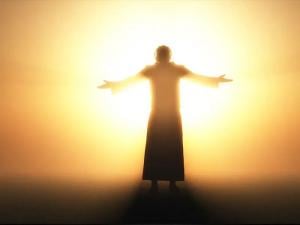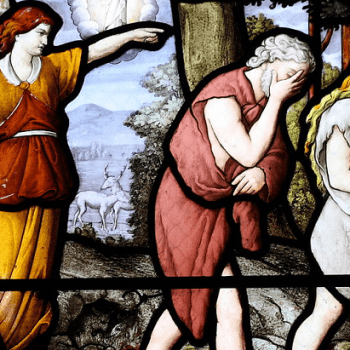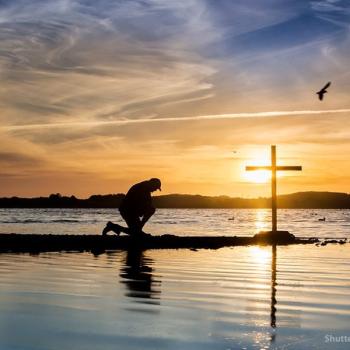
In the previous segments we’ve learned that only a powerful forgiveness event can resolve our insolvable problems: that we are fallen and cannot save ourselves, that we cannot be saved in our sins, and also that we must not die in our sins.
Once we accept a comprehensive saving event, and its effects: redemption, re-birth, being changed to a state of righteousness, then we will begin to recognize an entirely new message from the scriptures. Once we understand that the whole of our mortal existence is spent in either the state of wickedness or the state of righteousness, we will begin to recognize the thousands of scriptures that refer to these two states. References to our fallen state use terms like, “in our sins,” “natural man,” “of nature,” “not redeemed,” “state of wickedness.” (1 Cor. 15:17; 2 Ne 9:38; Mosiah 2:33; Alma 11:37 and 12:16-18.)
Terms that refer to our forgiven state include: “saved,” “redeemed,” “born again,” “reconciled,” “new creature,” “washed in His blood,” “his image in your countenance,” “alive in Christ,” “in Christ,” “in the spirit,” “Christ in us,” and mercy rather than justice.
All of these conditions happen at the same time and are the effects of being forgiven, for example, “Therefore if any man be in Christ, he is a new creature: old things are passed away; behold, all things are become new” (2 Corinthians 5:17). Now that we understand the term “in Christ” refers to our state after being redeemed, this verse tells us, anyone who has been redeemed becomes a completely new creature, and everything is different.
“Everything is different” is the biggest understatement in the universe. One unbelievable difference is our relationship with the law–with all the commandments. If we really can be forgiven for all our sins right now, if we really can be imputed with Christ’s righteousness (justified), then the logical conclusion is that we are no longer in jeopardy of justice, no longer in danger of punishment from the law, right? You cannot be pardoned from punishment, and still be punished, right? You cannot have Christ’s righteousness and need more righteousness, can you?
It’s likely that you just reacted the same as Paul’s audience, “What then? shall we sin, because we are not under the law, but under grace?” (Romans 6:15). Paul’s answer was, “God forbid!”, in other words, of course not! But the premise of their question shows that Paul had been teaching a forgiveness so comprehensive as to render the law “dead.”
Let’s take the concept of forgiveness to its logical and astounding conclusion; if we are forgiven for all our sins, including future sins, then doesn’t that essentially render the law meaningless? Couldn’t you say the law becomes “dead”? For example, if you break a commandment, but have already been forgiven of that sin, then it’s as if there is no commandment, right? Well, that astounding conclusion is exactly what Paul teaches the Romans, Ephesians, and Galatians, that once justified, we are no longer under the law.
What? Forgiven of future sins? No longer under the law? (I know, more cognitive dissonance–sorry). It’s because of teachings like this that many Latter-Day Saints think Paul was a little off the rails. And yet Nephi teaches the same thing! “For this end was the law given; wherefore the law hath become dead unto us, and we are made alive in Christ because of our faith… we speak concerning the law that our children may know the deadness of the law; and they, by knowing the deadness of the law, may look forward unto that life which is in Christ, and know for what end the law was given (2 Ne 25:25, 27).
Was Nephi off the rails too? Was he only referring to the law of Moses being dead? Nope, it’s God’s law, the law that defines sin, the law that will punish the impenitent (2 Ne 2:26; Alma 42:23). And we can trust that Paul and Nephi were not off the rails because Christ himself taught this exact same doctrine. Please read Matt 12:1-8. In this account the ever-present Pharisees see the disciples do something wrong; they pick grain on the Sabbath. (I’m not sure why the Pharisees didn’t also condemn them for stealing, since it wasn’t their grain, but I digress).
Anyway, Jesus answers the Pharisees by giving examples of others who broke the law. David broke the commandment by eating the holy bread. And the priests who profane the sabbath also broke the commandment, but because they work in the temple, they are blameless. And then Jesus makes the audacious statement that he is greater than the temple! So, although his disciples did indeed break the sabbath by picking the grain, (and stealing) they are guiltless because they are with him, and he is greater than the Sabbath! So, Jesus is saying, yes, people break the law, everyone breaks the commandments, but their salvation is obtained by faith in me–by receiving mercy. “Christ is the end of the law for righteousness to everyone who believes.” (Romans 10:3,4)
This is the concept that Paul tries to teach using many different phrases, like, “dead to sin,” “free from sin,” “delivered from the law,” “no longer under the law”, and sin not being “imputed” to us (Rom 4:8; 6:2, 18, 22; 7:6; Gal 2:19; 3:13; 5:18). This concept is hard to accept , but even simple logic brings us to the same conclusion; that once forgiven for all our sins, we can no longer be condemned by the law.
So Paul teaches this doctrine every way he can think of, by metaphor, by simply stating it, and yet, it was lost on many of the Romans, Ephesians, and Galatians just like it’s lost on us. Don’t we too want a reward for our good deeds, and want criminals punished? Forgiving huge debts, looking at the serpent, washing in the stream, the prodigal son, these are inspiring stories, but do we really believe they apply to us?
Please read Galatians chapters 2-5, and Romans chapters 3-8. You can feel Paul’s exasperation as he says, “Tell me, ye that desire to be under the law, do ye not hear the law!” (Gal 4:21). In other words, he is saying, you keep trying to make salvation about keeping the commandments, do you not understand what that means? Do you not understand the impossibility of keeping all the commandments! Do you really want that heavy yoke?
He continues in Galatians 5:1, “Stand fast therefore in the liberty wherewith Christ hath made us free, and be not entangled again with the yoke of bondage” because he who thinks obedience to the laws will save him, is obligated to keep it perfectly, “is a debtor to do the whole law” 5:3. Then he says in effect, if you insist that obedience to the law, (for example circumcision), is what saves you, then “Christ is become of no effect unto you. Whosoever of you are justified by the law, ye are fallen from grace.” 5:4 And, “if ye be led of the spirit, ye are not under the law.” 5:18. In other words, once you have been justified, you are not under the law.
I hope these articles help us better understand repentance, forgiveness, and redemption. If we don’t correctly understand these doctrines, it’s easy to reach incorrect conclusions about which is the cause and which is the effect of salvation. For example, many believe that good works cause the effect of salvation; when actually the scriptures teach that good works–as defined by God–do not even exist until after we’ve been saved. As we see with Benjamin’s people, forgiveness–not obedience–is the key to joy and peace.
Being forgiven and redeemed are true and attainable states, in this life, right now. Contemplate that wonderful possibility; imagine the peace of knowing that Jesus has forgiven you. Imagine knowing that He will conquer your most unconquerable faults. What if rather than worry, you had joy? What if every day you could have a perfect brightness of hope that you will receive eternal life in the Kingdom of God?













